Meaning and Defensibility of the Slogan 'Truth is Subjectivity'
VerifiedAdded on 2023/01/06
|10
|3617
|80
AI Summary
This report analyzes the meaning and defensibility of the slogan 'Truth is Subjectivity' in Kierkegaard's philosophy. It explores the relationship between truth and subjectivity and the implications for individuals. The report focuses on the essentialness of subjectivity and the way individuals relate to truth. It also discusses the concept of commitment as a leap of faith and the importance of personal demands in embracing truth.
Contribute Materials
Your contribution can guide someone’s learning journey. Share your
documents today.
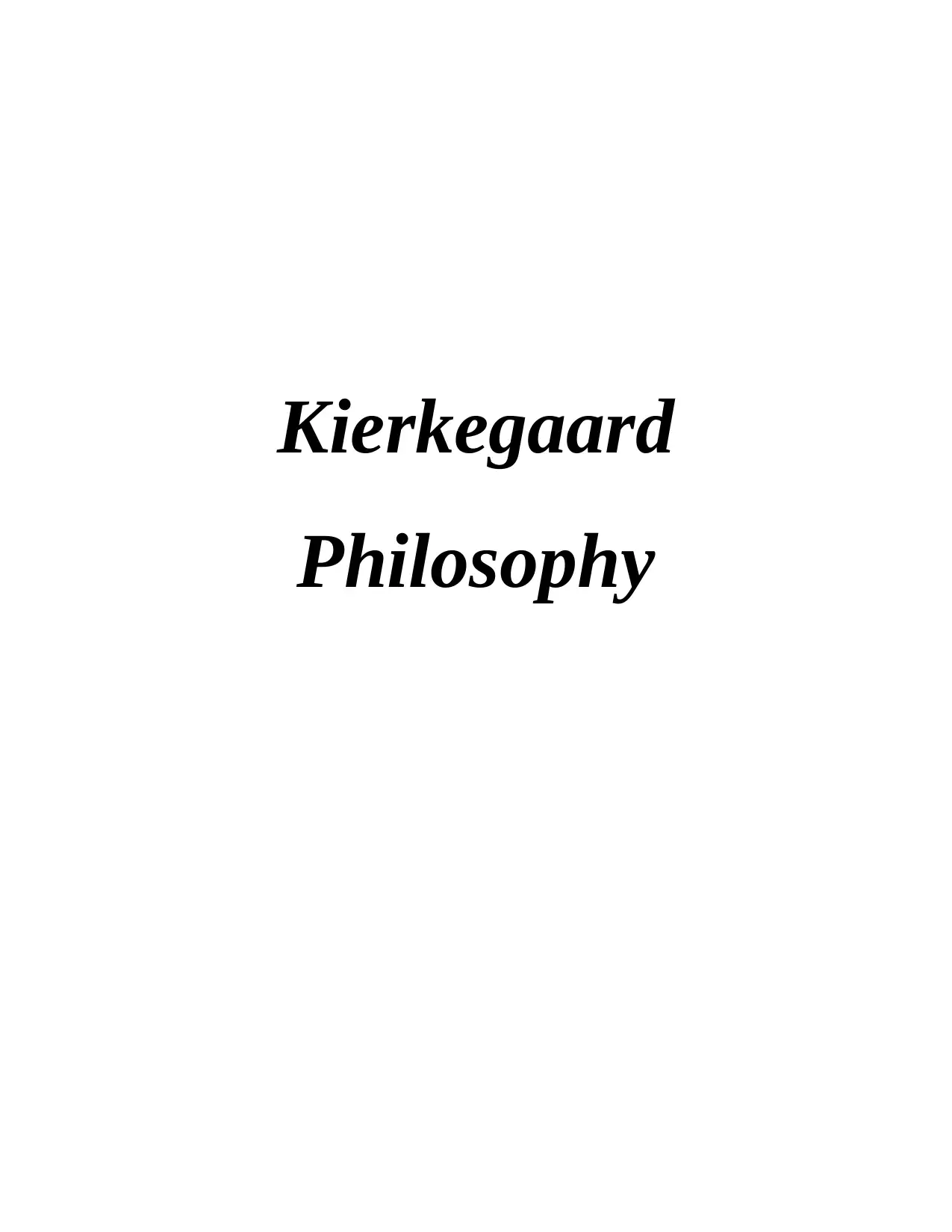
Kierkegaard
Philosophy
Philosophy
Secure Best Marks with AI Grader
Need help grading? Try our AI Grader for instant feedback on your assignments.
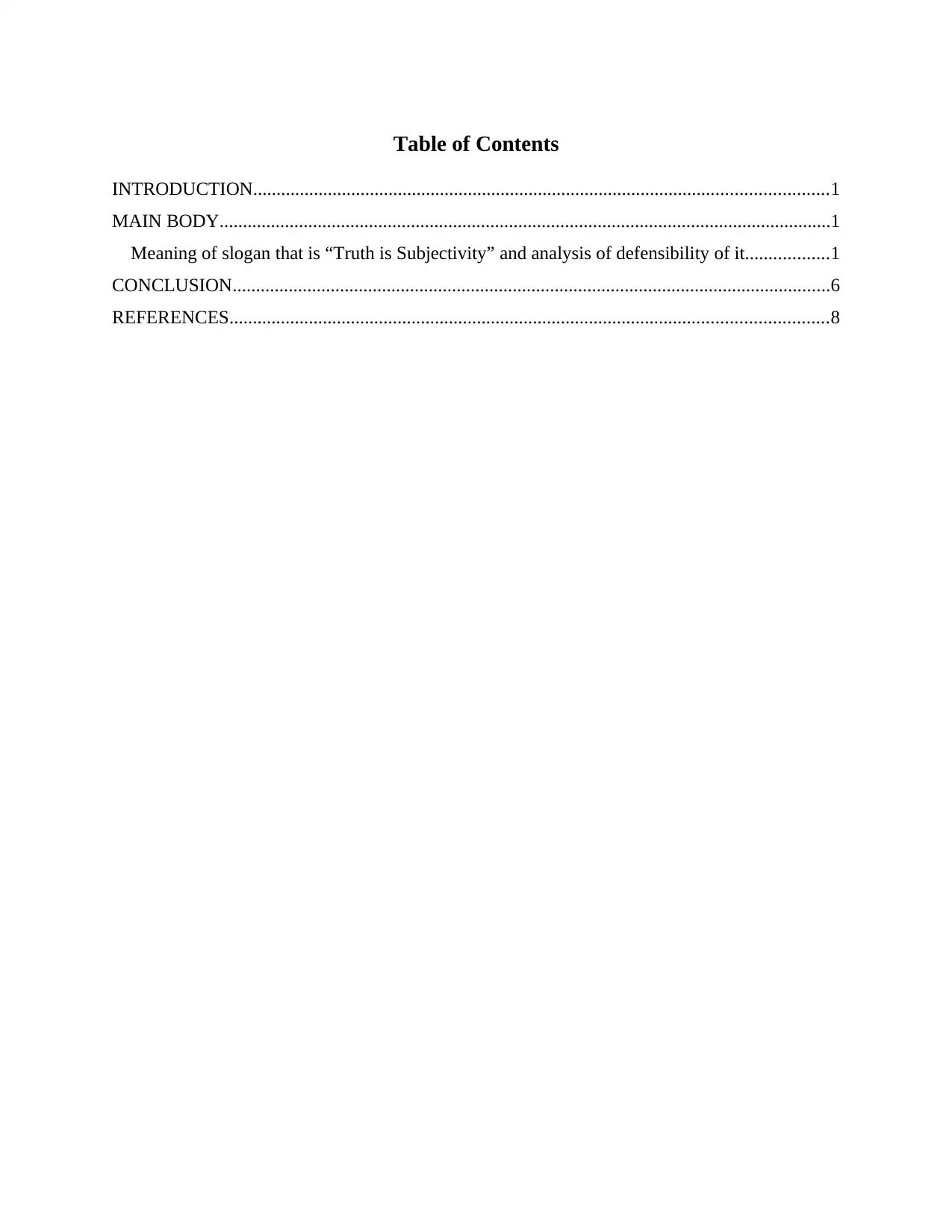
Table of Contents
INTRODUCTION...........................................................................................................................1
MAIN BODY...................................................................................................................................1
Meaning of slogan that is “Truth is Subjectivity” and analysis of defensibility of it..................1
CONCLUSION................................................................................................................................6
REFERENCES................................................................................................................................8
INTRODUCTION...........................................................................................................................1
MAIN BODY...................................................................................................................................1
Meaning of slogan that is “Truth is Subjectivity” and analysis of defensibility of it..................1
CONCLUSION................................................................................................................................6
REFERENCES................................................................................................................................8
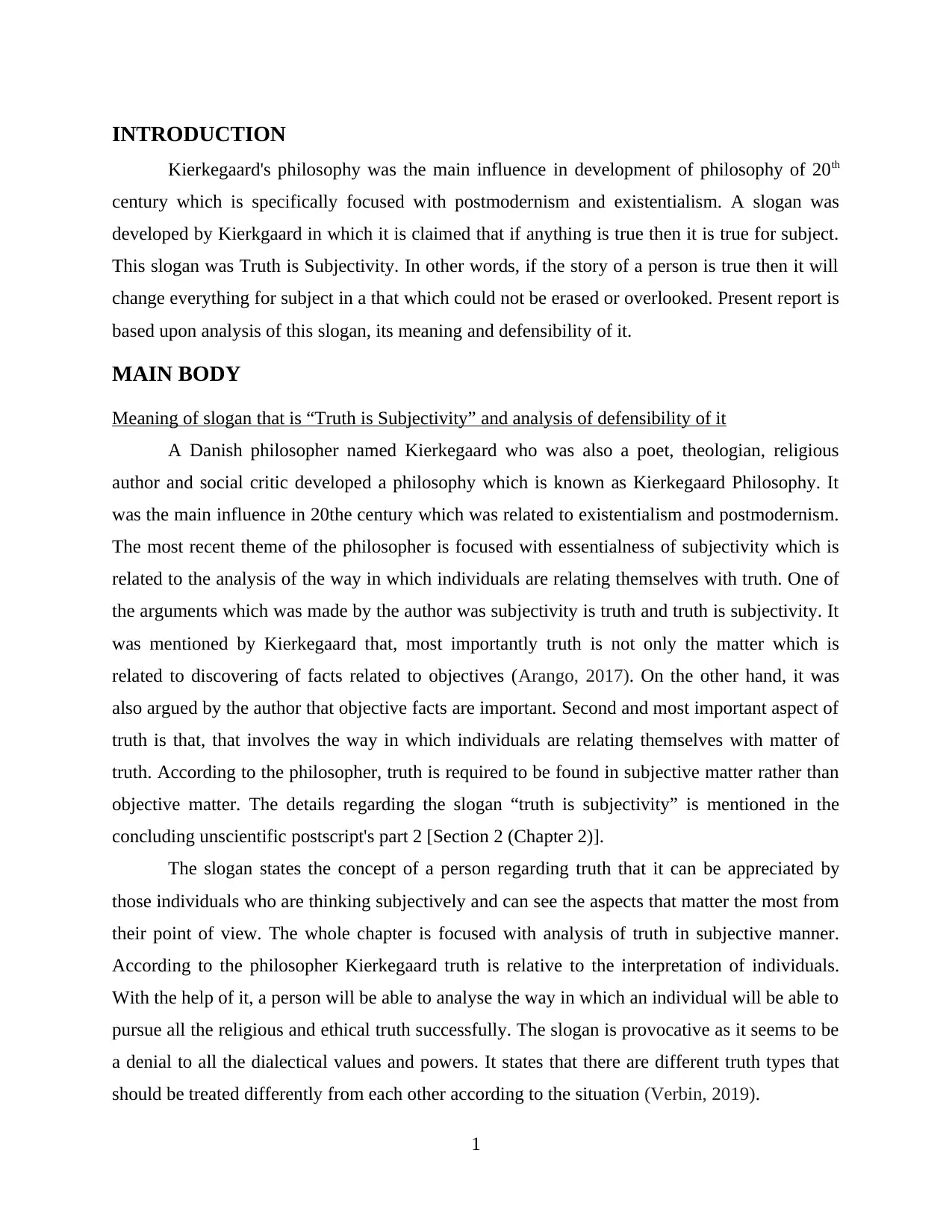
INTRODUCTION
Kierkegaard's philosophy was the main influence in development of philosophy of 20th
century which is specifically focused with postmodernism and existentialism. A slogan was
developed by Kierkgaard in which it is claimed that if anything is true then it is true for subject.
This slogan was Truth is Subjectivity. In other words, if the story of a person is true then it will
change everything for subject in a that which could not be erased or overlooked. Present report is
based upon analysis of this slogan, its meaning and defensibility of it.
MAIN BODY
Meaning of slogan that is “Truth is Subjectivity” and analysis of defensibility of it
A Danish philosopher named Kierkegaard who was also a poet, theologian, religious
author and social critic developed a philosophy which is known as Kierkegaard Philosophy. It
was the main influence in 20the century which was related to existentialism and postmodernism.
The most recent theme of the philosopher is focused with essentialness of subjectivity which is
related to the analysis of the way in which individuals are relating themselves with truth. One of
the arguments which was made by the author was subjectivity is truth and truth is subjectivity. It
was mentioned by Kierkegaard that, most importantly truth is not only the matter which is
related to discovering of facts related to objectives (Arango, 2017). On the other hand, it was
also argued by the author that objective facts are important. Second and most important aspect of
truth is that, that involves the way in which individuals are relating themselves with matter of
truth. According to the philosopher, truth is required to be found in subjective matter rather than
objective matter. The details regarding the slogan “truth is subjectivity” is mentioned in the
concluding unscientific postscript's part 2 [Section 2 (Chapter 2)].
The slogan states the concept of a person regarding truth that it can be appreciated by
those individuals who are thinking subjectively and can see the aspects that matter the most from
their point of view. The whole chapter is focused with analysis of truth in subjective manner.
According to the philosopher Kierkegaard truth is relative to the interpretation of individuals.
With the help of it, a person will be able to analyse the way in which an individual will be able to
pursue all the religious and ethical truth successfully. The slogan is provocative as it seems to be
a denial to all the dialectical values and powers. It states that there are different truth types that
should be treated differently from each other according to the situation (Verbin, 2019).
1
Kierkegaard's philosophy was the main influence in development of philosophy of 20th
century which is specifically focused with postmodernism and existentialism. A slogan was
developed by Kierkgaard in which it is claimed that if anything is true then it is true for subject.
This slogan was Truth is Subjectivity. In other words, if the story of a person is true then it will
change everything for subject in a that which could not be erased or overlooked. Present report is
based upon analysis of this slogan, its meaning and defensibility of it.
MAIN BODY
Meaning of slogan that is “Truth is Subjectivity” and analysis of defensibility of it
A Danish philosopher named Kierkegaard who was also a poet, theologian, religious
author and social critic developed a philosophy which is known as Kierkegaard Philosophy. It
was the main influence in 20the century which was related to existentialism and postmodernism.
The most recent theme of the philosopher is focused with essentialness of subjectivity which is
related to the analysis of the way in which individuals are relating themselves with truth. One of
the arguments which was made by the author was subjectivity is truth and truth is subjectivity. It
was mentioned by Kierkegaard that, most importantly truth is not only the matter which is
related to discovering of facts related to objectives (Arango, 2017). On the other hand, it was
also argued by the author that objective facts are important. Second and most important aspect of
truth is that, that involves the way in which individuals are relating themselves with matter of
truth. According to the philosopher, truth is required to be found in subjective matter rather than
objective matter. The details regarding the slogan “truth is subjectivity” is mentioned in the
concluding unscientific postscript's part 2 [Section 2 (Chapter 2)].
The slogan states the concept of a person regarding truth that it can be appreciated by
those individuals who are thinking subjectively and can see the aspects that matter the most from
their point of view. The whole chapter is focused with analysis of truth in subjective manner.
According to the philosopher Kierkegaard truth is relative to the interpretation of individuals.
With the help of it, a person will be able to analyse the way in which an individual will be able to
pursue all the religious and ethical truth successfully. The slogan is provocative as it seems to be
a denial to all the dialectical values and powers. It states that there are different truth types that
should be treated differently from each other according to the situation (Verbin, 2019).
1
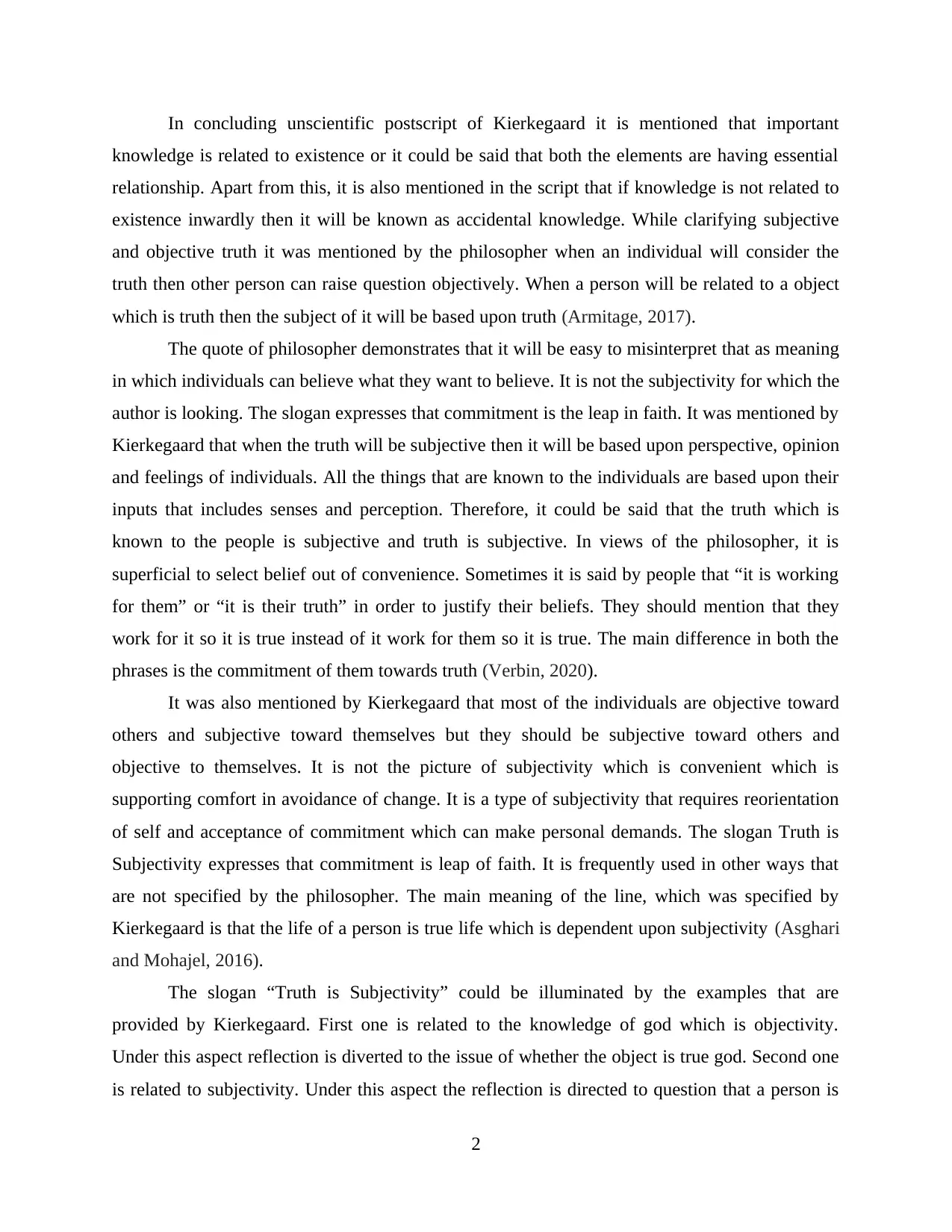
In concluding unscientific postscript of Kierkegaard it is mentioned that important
knowledge is related to existence or it could be said that both the elements are having essential
relationship. Apart from this, it is also mentioned in the script that if knowledge is not related to
existence inwardly then it will be known as accidental knowledge. While clarifying subjective
and objective truth it was mentioned by the philosopher when an individual will consider the
truth then other person can raise question objectively. When a person will be related to a object
which is truth then the subject of it will be based upon truth (Armitage, 2017).
The quote of philosopher demonstrates that it will be easy to misinterpret that as meaning
in which individuals can believe what they want to believe. It is not the subjectivity for which the
author is looking. The slogan expresses that commitment is the leap in faith. It was mentioned by
Kierkegaard that when the truth will be subjective then it will be based upon perspective, opinion
and feelings of individuals. All the things that are known to the individuals are based upon their
inputs that includes senses and perception. Therefore, it could be said that the truth which is
known to the people is subjective and truth is subjective. In views of the philosopher, it is
superficial to select belief out of convenience. Sometimes it is said by people that “it is working
for them” or “it is their truth” in order to justify their beliefs. They should mention that they
work for it so it is true instead of it work for them so it is true. The main difference in both the
phrases is the commitment of them towards truth (Verbin, 2020).
It was also mentioned by Kierkegaard that most of the individuals are objective toward
others and subjective toward themselves but they should be subjective toward others and
objective to themselves. It is not the picture of subjectivity which is convenient which is
supporting comfort in avoidance of change. It is a type of subjectivity that requires reorientation
of self and acceptance of commitment which can make personal demands. The slogan Truth is
Subjectivity expresses that commitment is leap of faith. It is frequently used in other ways that
are not specified by the philosopher. The main meaning of the line, which was specified by
Kierkegaard is that the life of a person is true life which is dependent upon subjectivity (Asghari
and Mohajel, 2016).
The slogan “Truth is Subjectivity” could be illuminated by the examples that are
provided by Kierkegaard. First one is related to the knowledge of god which is objectivity.
Under this aspect reflection is diverted to the issue of whether the object is true god. Second one
is related to subjectivity. Under this aspect the reflection is directed to question that a person is
2
knowledge is related to existence or it could be said that both the elements are having essential
relationship. Apart from this, it is also mentioned in the script that if knowledge is not related to
existence inwardly then it will be known as accidental knowledge. While clarifying subjective
and objective truth it was mentioned by the philosopher when an individual will consider the
truth then other person can raise question objectively. When a person will be related to a object
which is truth then the subject of it will be based upon truth (Armitage, 2017).
The quote of philosopher demonstrates that it will be easy to misinterpret that as meaning
in which individuals can believe what they want to believe. It is not the subjectivity for which the
author is looking. The slogan expresses that commitment is the leap in faith. It was mentioned by
Kierkegaard that when the truth will be subjective then it will be based upon perspective, opinion
and feelings of individuals. All the things that are known to the individuals are based upon their
inputs that includes senses and perception. Therefore, it could be said that the truth which is
known to the people is subjective and truth is subjective. In views of the philosopher, it is
superficial to select belief out of convenience. Sometimes it is said by people that “it is working
for them” or “it is their truth” in order to justify their beliefs. They should mention that they
work for it so it is true instead of it work for them so it is true. The main difference in both the
phrases is the commitment of them towards truth (Verbin, 2020).
It was also mentioned by Kierkegaard that most of the individuals are objective toward
others and subjective toward themselves but they should be subjective toward others and
objective to themselves. It is not the picture of subjectivity which is convenient which is
supporting comfort in avoidance of change. It is a type of subjectivity that requires reorientation
of self and acceptance of commitment which can make personal demands. The slogan Truth is
Subjectivity expresses that commitment is leap of faith. It is frequently used in other ways that
are not specified by the philosopher. The main meaning of the line, which was specified by
Kierkegaard is that the life of a person is true life which is dependent upon subjectivity (Asghari
and Mohajel, 2016).
The slogan “Truth is Subjectivity” could be illuminated by the examples that are
provided by Kierkegaard. First one is related to the knowledge of god which is objectivity.
Under this aspect reflection is diverted to the issue of whether the object is true god. Second one
is related to subjectivity. Under this aspect the reflection is directed to question that a person is
2
Secure Best Marks with AI Grader
Need help grading? Try our AI Grader for instant feedback on your assignments.
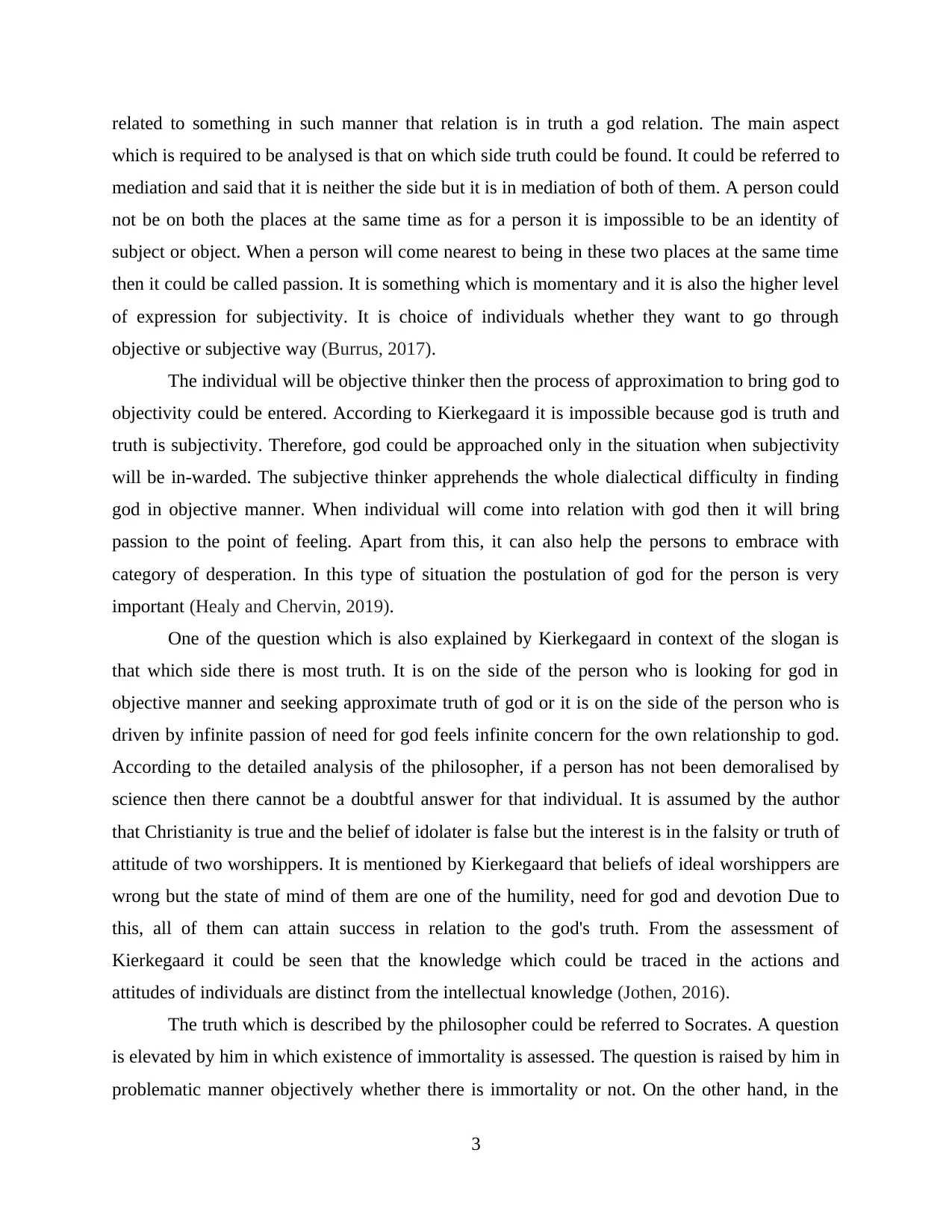
related to something in such manner that relation is in truth a god relation. The main aspect
which is required to be analysed is that on which side truth could be found. It could be referred to
mediation and said that it is neither the side but it is in mediation of both of them. A person could
not be on both the places at the same time as for a person it is impossible to be an identity of
subject or object. When a person will come nearest to being in these two places at the same time
then it could be called passion. It is something which is momentary and it is also the higher level
of expression for subjectivity. It is choice of individuals whether they want to go through
objective or subjective way (Burrus, 2017).
The individual will be objective thinker then the process of approximation to bring god to
objectivity could be entered. According to Kierkegaard it is impossible because god is truth and
truth is subjectivity. Therefore, god could be approached only in the situation when subjectivity
will be in-warded. The subjective thinker apprehends the whole dialectical difficulty in finding
god in objective manner. When individual will come into relation with god then it will bring
passion to the point of feeling. Apart from this, it can also help the persons to embrace with
category of desperation. In this type of situation the postulation of god for the person is very
important (Healy and Chervin, 2019).
One of the question which is also explained by Kierkegaard in context of the slogan is
that which side there is most truth. It is on the side of the person who is looking for god in
objective manner and seeking approximate truth of god or it is on the side of the person who is
driven by infinite passion of need for god feels infinite concern for the own relationship to god.
According to the detailed analysis of the philosopher, if a person has not been demoralised by
science then there cannot be a doubtful answer for that individual. It is assumed by the author
that Christianity is true and the belief of idolater is false but the interest is in the falsity or truth of
attitude of two worshippers. It is mentioned by Kierkegaard that beliefs of ideal worshippers are
wrong but the state of mind of them are one of the humility, need for god and devotion Due to
this, all of them can attain success in relation to the god's truth. From the assessment of
Kierkegaard it could be seen that the knowledge which could be traced in the actions and
attitudes of individuals are distinct from the intellectual knowledge (Jothen, 2016).
The truth which is described by the philosopher could be referred to Socrates. A question
is elevated by him in which existence of immortality is assessed. The question is raised by him in
problematic manner objectively whether there is immortality or not. On the other hand, in the
3
which is required to be analysed is that on which side truth could be found. It could be referred to
mediation and said that it is neither the side but it is in mediation of both of them. A person could
not be on both the places at the same time as for a person it is impossible to be an identity of
subject or object. When a person will come nearest to being in these two places at the same time
then it could be called passion. It is something which is momentary and it is also the higher level
of expression for subjectivity. It is choice of individuals whether they want to go through
objective or subjective way (Burrus, 2017).
The individual will be objective thinker then the process of approximation to bring god to
objectivity could be entered. According to Kierkegaard it is impossible because god is truth and
truth is subjectivity. Therefore, god could be approached only in the situation when subjectivity
will be in-warded. The subjective thinker apprehends the whole dialectical difficulty in finding
god in objective manner. When individual will come into relation with god then it will bring
passion to the point of feeling. Apart from this, it can also help the persons to embrace with
category of desperation. In this type of situation the postulation of god for the person is very
important (Healy and Chervin, 2019).
One of the question which is also explained by Kierkegaard in context of the slogan is
that which side there is most truth. It is on the side of the person who is looking for god in
objective manner and seeking approximate truth of god or it is on the side of the person who is
driven by infinite passion of need for god feels infinite concern for the own relationship to god.
According to the detailed analysis of the philosopher, if a person has not been demoralised by
science then there cannot be a doubtful answer for that individual. It is assumed by the author
that Christianity is true and the belief of idolater is false but the interest is in the falsity or truth of
attitude of two worshippers. It is mentioned by Kierkegaard that beliefs of ideal worshippers are
wrong but the state of mind of them are one of the humility, need for god and devotion Due to
this, all of them can attain success in relation to the god's truth. From the assessment of
Kierkegaard it could be seen that the knowledge which could be traced in the actions and
attitudes of individuals are distinct from the intellectual knowledge (Jothen, 2016).
The truth which is described by the philosopher could be referred to Socrates. A question
is elevated by him in which existence of immortality is assessed. The question is raised by him in
problematic manner objectively whether there is immortality or not. On the other hand, in the
3
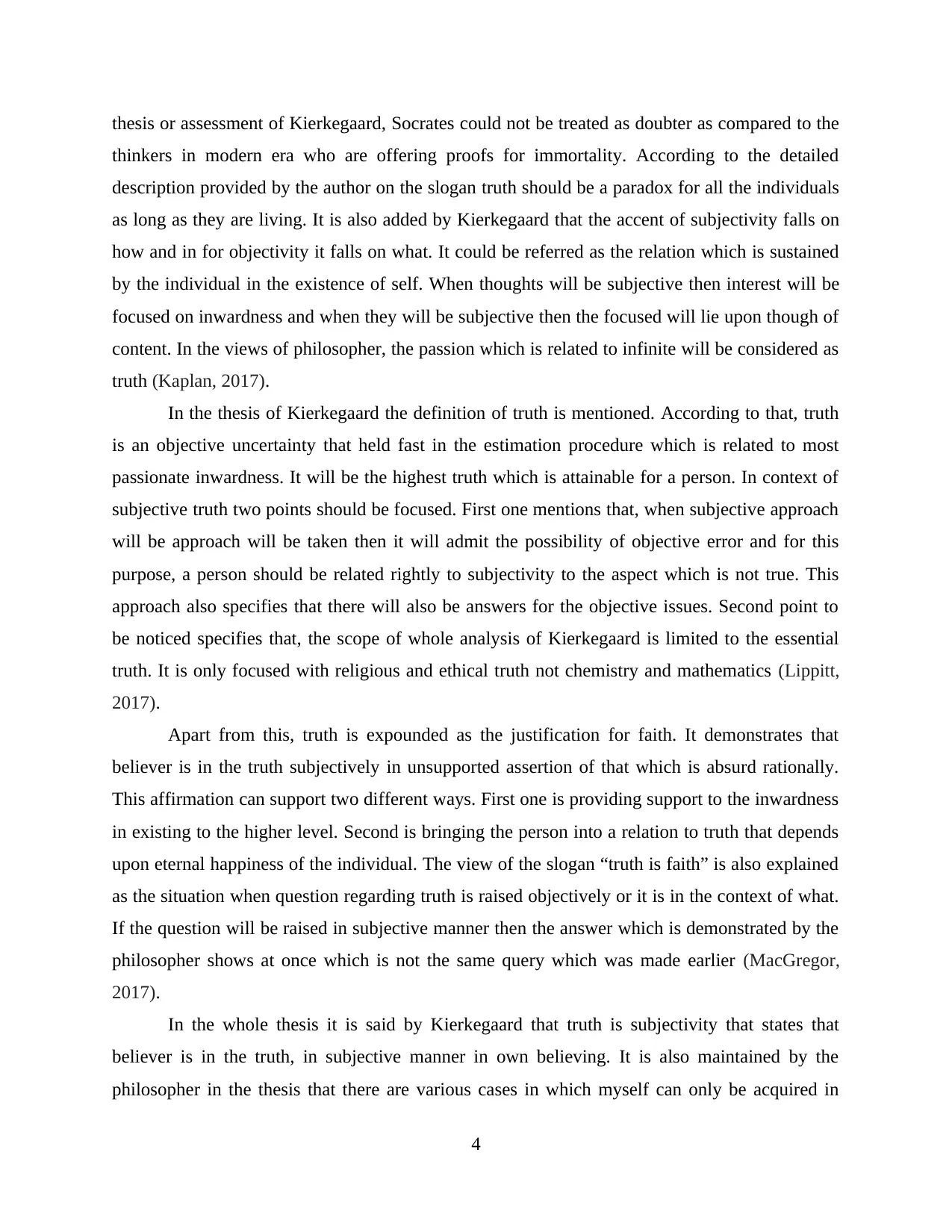
thesis or assessment of Kierkegaard, Socrates could not be treated as doubter as compared to the
thinkers in modern era who are offering proofs for immortality. According to the detailed
description provided by the author on the slogan truth should be a paradox for all the individuals
as long as they are living. It is also added by Kierkegaard that the accent of subjectivity falls on
how and in for objectivity it falls on what. It could be referred as the relation which is sustained
by the individual in the existence of self. When thoughts will be subjective then interest will be
focused on inwardness and when they will be subjective then the focused will lie upon though of
content. In the views of philosopher, the passion which is related to infinite will be considered as
truth (Kaplan, 2017).
In the thesis of Kierkegaard the definition of truth is mentioned. According to that, truth
is an objective uncertainty that held fast in the estimation procedure which is related to most
passionate inwardness. It will be the highest truth which is attainable for a person. In context of
subjective truth two points should be focused. First one mentions that, when subjective approach
will be approach will be taken then it will admit the possibility of objective error and for this
purpose, a person should be related rightly to subjectivity to the aspect which is not true. This
approach also specifies that there will also be answers for the objective issues. Second point to
be noticed specifies that, the scope of whole analysis of Kierkegaard is limited to the essential
truth. It is only focused with religious and ethical truth not chemistry and mathematics (Lippitt,
2017).
Apart from this, truth is expounded as the justification for faith. It demonstrates that
believer is in the truth subjectively in unsupported assertion of that which is absurd rationally.
This affirmation can support two different ways. First one is providing support to the inwardness
in existing to the higher level. Second is bringing the person into a relation to truth that depends
upon eternal happiness of the individual. The view of the slogan “truth is faith” is also explained
as the situation when question regarding truth is raised objectively or it is in the context of what.
If the question will be raised in subjective manner then the answer which is demonstrated by the
philosopher shows at once which is not the same query which was made earlier (MacGregor,
2017).
In the whole thesis it is said by Kierkegaard that truth is subjectivity that states that
believer is in the truth, in subjective manner in own believing. It is also maintained by the
philosopher in the thesis that there are various cases in which myself can only be acquired in
4
thinkers in modern era who are offering proofs for immortality. According to the detailed
description provided by the author on the slogan truth should be a paradox for all the individuals
as long as they are living. It is also added by Kierkegaard that the accent of subjectivity falls on
how and in for objectivity it falls on what. It could be referred as the relation which is sustained
by the individual in the existence of self. When thoughts will be subjective then interest will be
focused on inwardness and when they will be subjective then the focused will lie upon though of
content. In the views of philosopher, the passion which is related to infinite will be considered as
truth (Kaplan, 2017).
In the thesis of Kierkegaard the definition of truth is mentioned. According to that, truth
is an objective uncertainty that held fast in the estimation procedure which is related to most
passionate inwardness. It will be the highest truth which is attainable for a person. In context of
subjective truth two points should be focused. First one mentions that, when subjective approach
will be approach will be taken then it will admit the possibility of objective error and for this
purpose, a person should be related rightly to subjectivity to the aspect which is not true. This
approach also specifies that there will also be answers for the objective issues. Second point to
be noticed specifies that, the scope of whole analysis of Kierkegaard is limited to the essential
truth. It is only focused with religious and ethical truth not chemistry and mathematics (Lippitt,
2017).
Apart from this, truth is expounded as the justification for faith. It demonstrates that
believer is in the truth subjectively in unsupported assertion of that which is absurd rationally.
This affirmation can support two different ways. First one is providing support to the inwardness
in existing to the higher level. Second is bringing the person into a relation to truth that depends
upon eternal happiness of the individual. The view of the slogan “truth is faith” is also explained
as the situation when question regarding truth is raised objectively or it is in the context of what.
If the question will be raised in subjective manner then the answer which is demonstrated by the
philosopher shows at once which is not the same query which was made earlier (MacGregor,
2017).
In the whole thesis it is said by Kierkegaard that truth is subjectivity that states that
believer is in the truth, in subjective manner in own believing. It is also maintained by the
philosopher in the thesis that there are various cases in which myself can only be acquired in
4
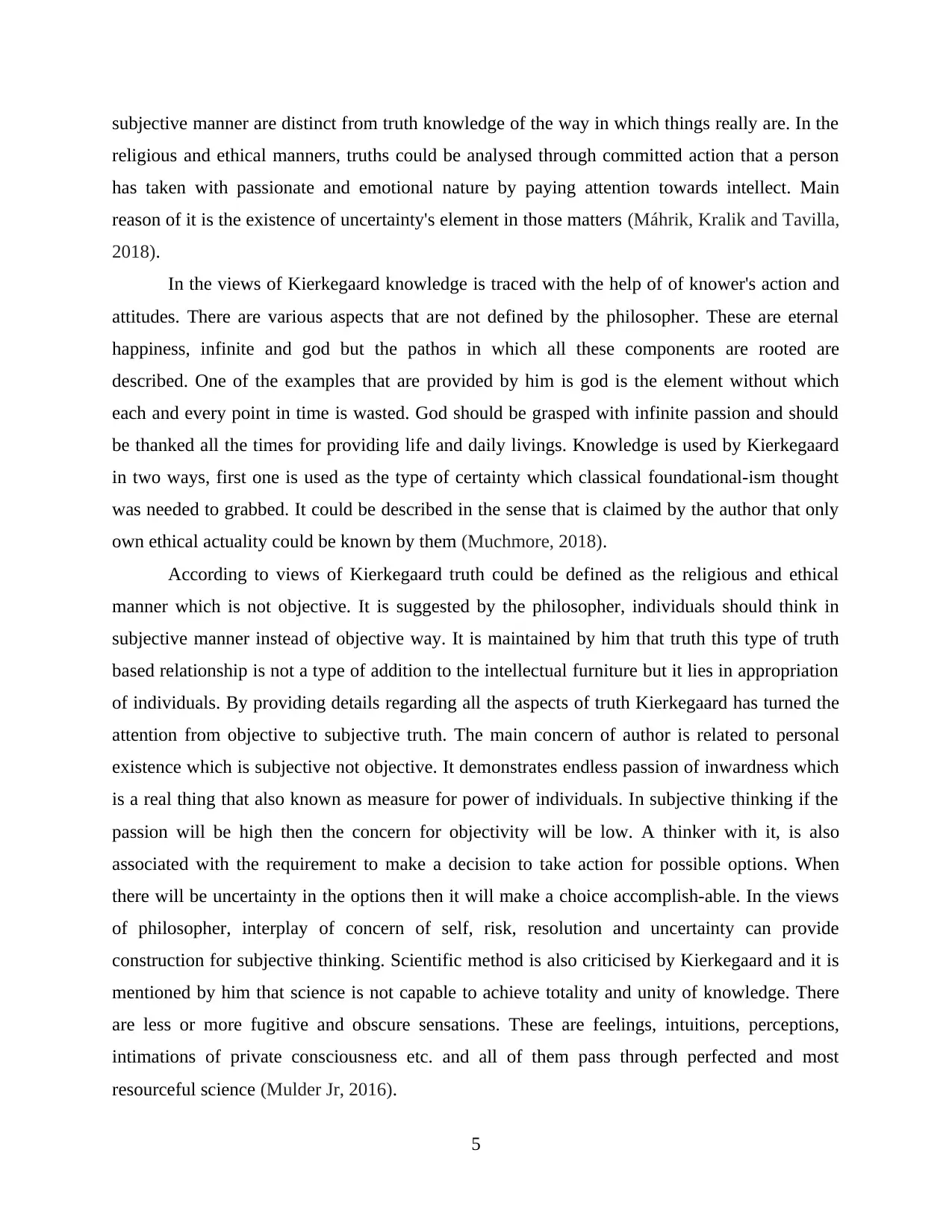
subjective manner are distinct from truth knowledge of the way in which things really are. In the
religious and ethical manners, truths could be analysed through committed action that a person
has taken with passionate and emotional nature by paying attention towards intellect. Main
reason of it is the existence of uncertainty's element in those matters (Máhrik, Kralik and Tavilla,
2018).
In the views of Kierkegaard knowledge is traced with the help of of knower's action and
attitudes. There are various aspects that are not defined by the philosopher. These are eternal
happiness, infinite and god but the pathos in which all these components are rooted are
described. One of the examples that are provided by him is god is the element without which
each and every point in time is wasted. God should be grasped with infinite passion and should
be thanked all the times for providing life and daily livings. Knowledge is used by Kierkegaard
in two ways, first one is used as the type of certainty which classical foundational-ism thought
was needed to grabbed. It could be described in the sense that is claimed by the author that only
own ethical actuality could be known by them (Muchmore, 2018).
According to views of Kierkegaard truth could be defined as the religious and ethical
manner which is not objective. It is suggested by the philosopher, individuals should think in
subjective manner instead of objective way. It is maintained by him that truth this type of truth
based relationship is not a type of addition to the intellectual furniture but it lies in appropriation
of individuals. By providing details regarding all the aspects of truth Kierkegaard has turned the
attention from objective to subjective truth. The main concern of author is related to personal
existence which is subjective not objective. It demonstrates endless passion of inwardness which
is a real thing that also known as measure for power of individuals. In subjective thinking if the
passion will be high then the concern for objectivity will be low. A thinker with it, is also
associated with the requirement to make a decision to take action for possible options. When
there will be uncertainty in the options then it will make a choice accomplish-able. In the views
of philosopher, interplay of concern of self, risk, resolution and uncertainty can provide
construction for subjective thinking. Scientific method is also criticised by Kierkegaard and it is
mentioned by him that science is not capable to achieve totality and unity of knowledge. There
are less or more fugitive and obscure sensations. These are feelings, intuitions, perceptions,
intimations of private consciousness etc. and all of them pass through perfected and most
resourceful science (Mulder Jr, 2016).
5
religious and ethical manners, truths could be analysed through committed action that a person
has taken with passionate and emotional nature by paying attention towards intellect. Main
reason of it is the existence of uncertainty's element in those matters (Máhrik, Kralik and Tavilla,
2018).
In the views of Kierkegaard knowledge is traced with the help of of knower's action and
attitudes. There are various aspects that are not defined by the philosopher. These are eternal
happiness, infinite and god but the pathos in which all these components are rooted are
described. One of the examples that are provided by him is god is the element without which
each and every point in time is wasted. God should be grasped with infinite passion and should
be thanked all the times for providing life and daily livings. Knowledge is used by Kierkegaard
in two ways, first one is used as the type of certainty which classical foundational-ism thought
was needed to grabbed. It could be described in the sense that is claimed by the author that only
own ethical actuality could be known by them (Muchmore, 2018).
According to views of Kierkegaard truth could be defined as the religious and ethical
manner which is not objective. It is suggested by the philosopher, individuals should think in
subjective manner instead of objective way. It is maintained by him that truth this type of truth
based relationship is not a type of addition to the intellectual furniture but it lies in appropriation
of individuals. By providing details regarding all the aspects of truth Kierkegaard has turned the
attention from objective to subjective truth. The main concern of author is related to personal
existence which is subjective not objective. It demonstrates endless passion of inwardness which
is a real thing that also known as measure for power of individuals. In subjective thinking if the
passion will be high then the concern for objectivity will be low. A thinker with it, is also
associated with the requirement to make a decision to take action for possible options. When
there will be uncertainty in the options then it will make a choice accomplish-able. In the views
of philosopher, interplay of concern of self, risk, resolution and uncertainty can provide
construction for subjective thinking. Scientific method is also criticised by Kierkegaard and it is
mentioned by him that science is not capable to achieve totality and unity of knowledge. There
are less or more fugitive and obscure sensations. These are feelings, intuitions, perceptions,
intimations of private consciousness etc. and all of them pass through perfected and most
resourceful science (Mulder Jr, 2016).
5
Paraphrase This Document
Need a fresh take? Get an instant paraphrase of this document with our AI Paraphraser
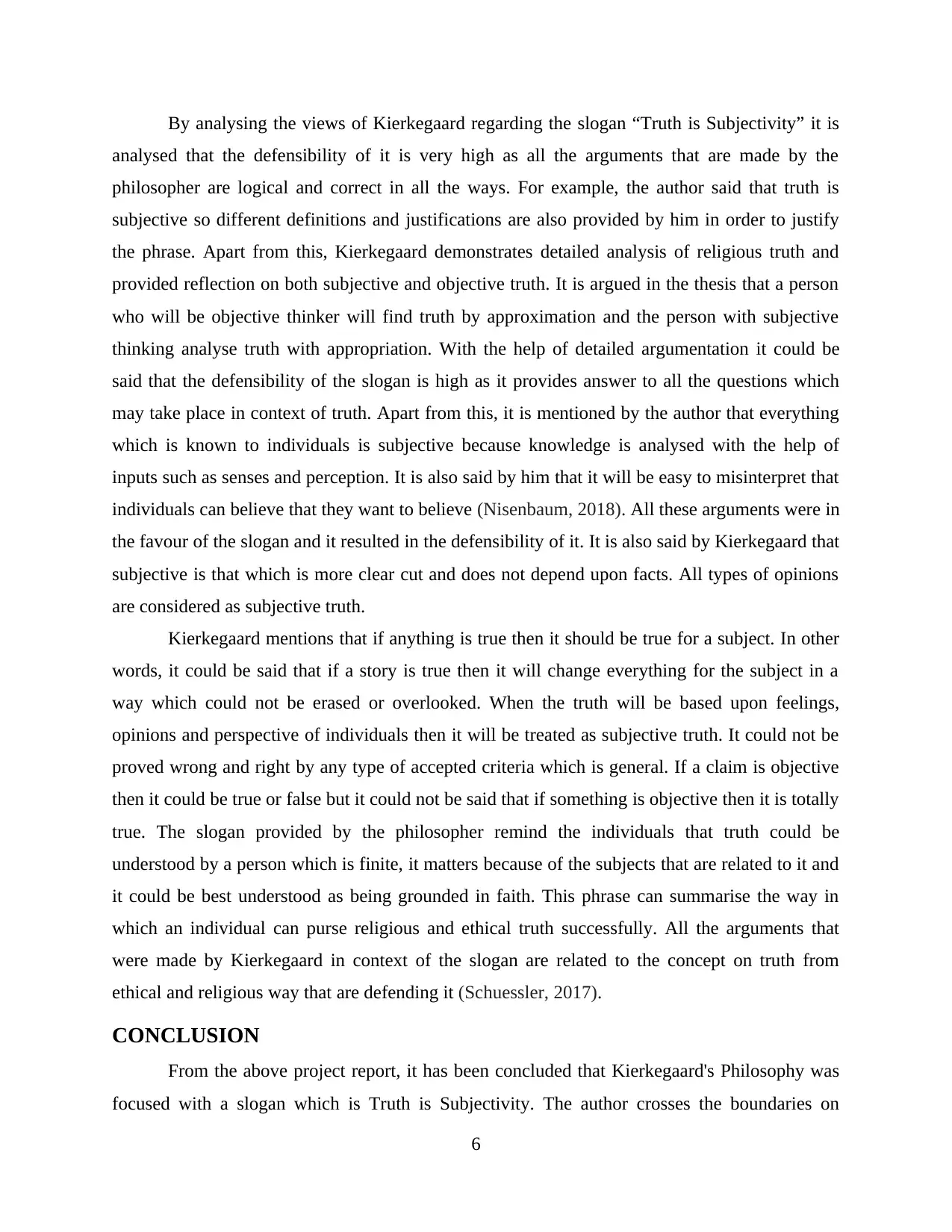
By analysing the views of Kierkegaard regarding the slogan “Truth is Subjectivity” it is
analysed that the defensibility of it is very high as all the arguments that are made by the
philosopher are logical and correct in all the ways. For example, the author said that truth is
subjective so different definitions and justifications are also provided by him in order to justify
the phrase. Apart from this, Kierkegaard demonstrates detailed analysis of religious truth and
provided reflection on both subjective and objective truth. It is argued in the thesis that a person
who will be objective thinker will find truth by approximation and the person with subjective
thinking analyse truth with appropriation. With the help of detailed argumentation it could be
said that the defensibility of the slogan is high as it provides answer to all the questions which
may take place in context of truth. Apart from this, it is mentioned by the author that everything
which is known to individuals is subjective because knowledge is analysed with the help of
inputs such as senses and perception. It is also said by him that it will be easy to misinterpret that
individuals can believe that they want to believe (Nisenbaum, 2018). All these arguments were in
the favour of the slogan and it resulted in the defensibility of it. It is also said by Kierkegaard that
subjective is that which is more clear cut and does not depend upon facts. All types of opinions
are considered as subjective truth.
Kierkegaard mentions that if anything is true then it should be true for a subject. In other
words, it could be said that if a story is true then it will change everything for the subject in a
way which could not be erased or overlooked. When the truth will be based upon feelings,
opinions and perspective of individuals then it will be treated as subjective truth. It could not be
proved wrong and right by any type of accepted criteria which is general. If a claim is objective
then it could be true or false but it could not be said that if something is objective then it is totally
true. The slogan provided by the philosopher remind the individuals that truth could be
understood by a person which is finite, it matters because of the subjects that are related to it and
it could be best understood as being grounded in faith. This phrase can summarise the way in
which an individual can purse religious and ethical truth successfully. All the arguments that
were made by Kierkegaard in context of the slogan are related to the concept on truth from
ethical and religious way that are defending it (Schuessler, 2017).
CONCLUSION
From the above project report, it has been concluded that Kierkegaard's Philosophy was
focused with a slogan which is Truth is Subjectivity. The author crosses the boundaries on
6
analysed that the defensibility of it is very high as all the arguments that are made by the
philosopher are logical and correct in all the ways. For example, the author said that truth is
subjective so different definitions and justifications are also provided by him in order to justify
the phrase. Apart from this, Kierkegaard demonstrates detailed analysis of religious truth and
provided reflection on both subjective and objective truth. It is argued in the thesis that a person
who will be objective thinker will find truth by approximation and the person with subjective
thinking analyse truth with appropriation. With the help of detailed argumentation it could be
said that the defensibility of the slogan is high as it provides answer to all the questions which
may take place in context of truth. Apart from this, it is mentioned by the author that everything
which is known to individuals is subjective because knowledge is analysed with the help of
inputs such as senses and perception. It is also said by him that it will be easy to misinterpret that
individuals can believe that they want to believe (Nisenbaum, 2018). All these arguments were in
the favour of the slogan and it resulted in the defensibility of it. It is also said by Kierkegaard that
subjective is that which is more clear cut and does not depend upon facts. All types of opinions
are considered as subjective truth.
Kierkegaard mentions that if anything is true then it should be true for a subject. In other
words, it could be said that if a story is true then it will change everything for the subject in a
way which could not be erased or overlooked. When the truth will be based upon feelings,
opinions and perspective of individuals then it will be treated as subjective truth. It could not be
proved wrong and right by any type of accepted criteria which is general. If a claim is objective
then it could be true or false but it could not be said that if something is objective then it is totally
true. The slogan provided by the philosopher remind the individuals that truth could be
understood by a person which is finite, it matters because of the subjects that are related to it and
it could be best understood as being grounded in faith. This phrase can summarise the way in
which an individual can purse religious and ethical truth successfully. All the arguments that
were made by Kierkegaard in context of the slogan are related to the concept on truth from
ethical and religious way that are defending it (Schuessler, 2017).
CONCLUSION
From the above project report, it has been concluded that Kierkegaard's Philosophy was
focused with a slogan which is Truth is Subjectivity. The author crosses the boundaries on
6
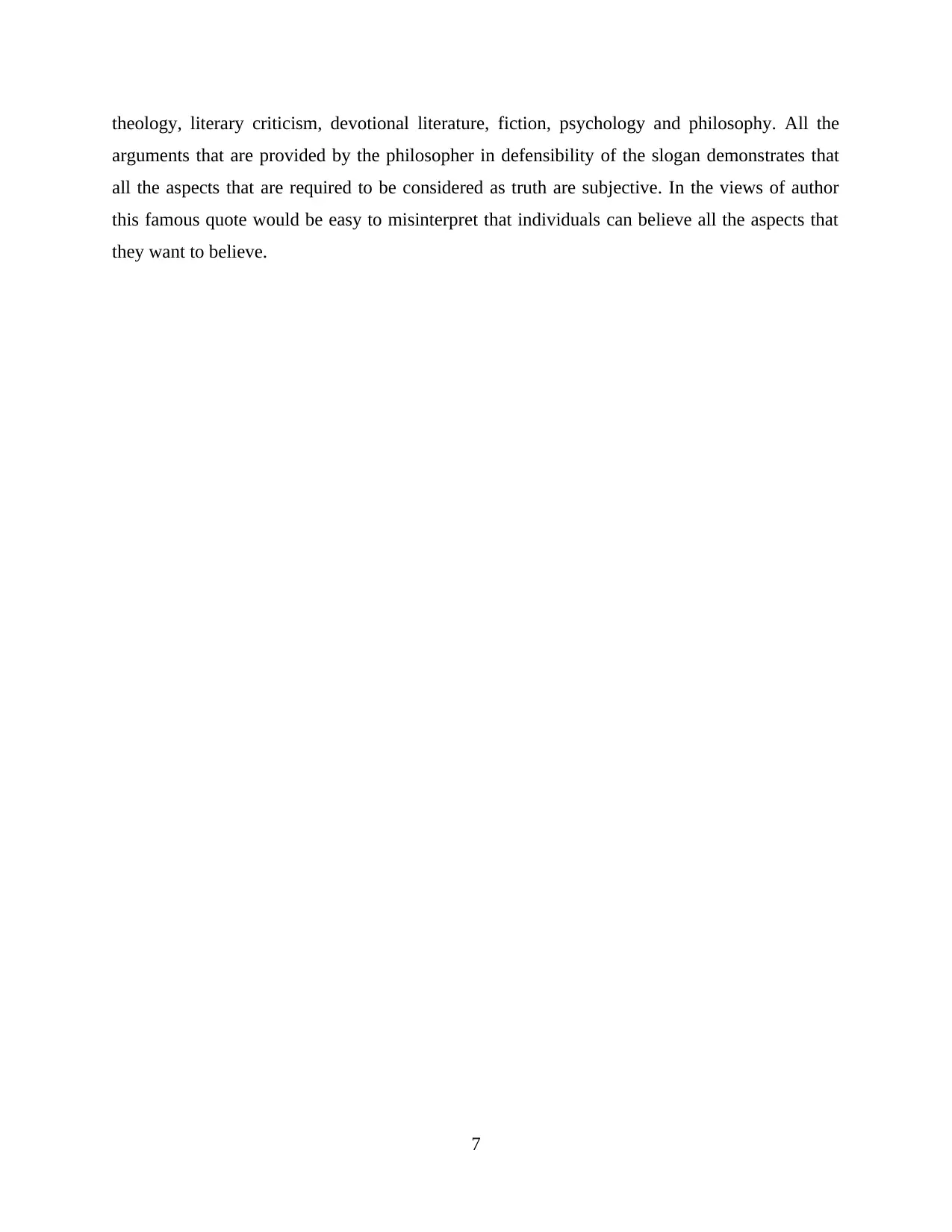
theology, literary criticism, devotional literature, fiction, psychology and philosophy. All the
arguments that are provided by the philosopher in defensibility of the slogan demonstrates that
all the aspects that are required to be considered as truth are subjective. In the views of author
this famous quote would be easy to misinterpret that individuals can believe all the aspects that
they want to believe.
7
arguments that are provided by the philosopher in defensibility of the slogan demonstrates that
all the aspects that are required to be considered as truth are subjective. In the views of author
this famous quote would be easy to misinterpret that individuals can believe all the aspects that
they want to believe.
7
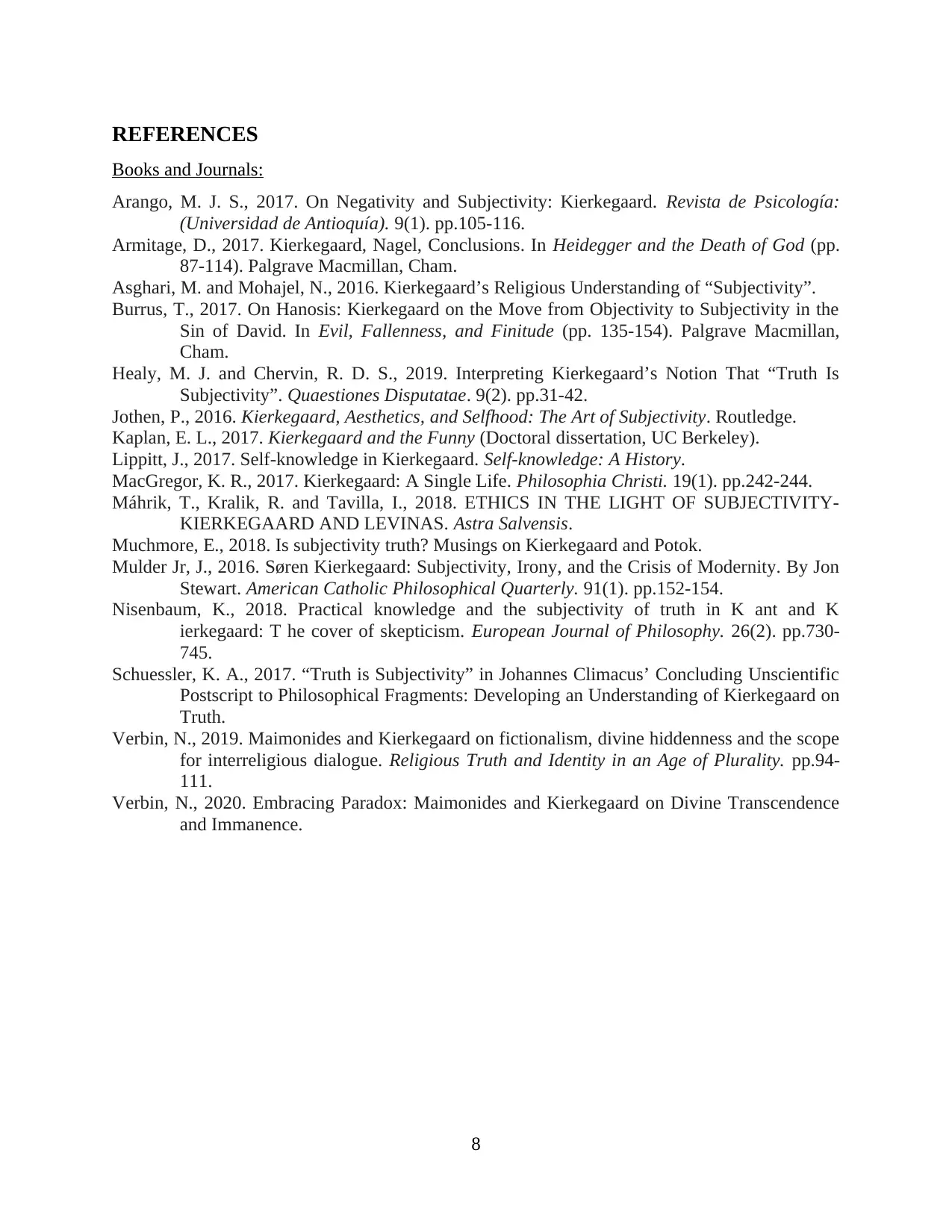
REFERENCES
Books and Journals:
Arango, M. J. S., 2017. On Negativity and Subjectivity: Kierkegaard. Revista de Psicología:
(Universidad de Antioquía). 9(1). pp.105-116.
Armitage, D., 2017. Kierkegaard, Nagel, Conclusions. In Heidegger and the Death of God (pp.
87-114). Palgrave Macmillan, Cham.
Asghari, M. and Mohajel, N., 2016. Kierkegaard’s Religious Understanding of “Subjectivity”.
Burrus, T., 2017. On Hanosis: Kierkegaard on the Move from Objectivity to Subjectivity in the
Sin of David. In Evil, Fallenness, and Finitude (pp. 135-154). Palgrave Macmillan,
Cham.
Healy, M. J. and Chervin, R. D. S., 2019. Interpreting Kierkegaard’s Notion That “Truth Is
Subjectivity”. Quaestiones Disputatae. 9(2). pp.31-42.
Jothen, P., 2016. Kierkegaard, Aesthetics, and Selfhood: The Art of Subjectivity. Routledge.
Kaplan, E. L., 2017. Kierkegaard and the Funny (Doctoral dissertation, UC Berkeley).
Lippitt, J., 2017. Self-knowledge in Kierkegaard. Self-knowledge: A History.
MacGregor, K. R., 2017. Kierkegaard: A Single Life. Philosophia Christi. 19(1). pp.242-244.
Máhrik, T., Kralik, R. and Tavilla, I., 2018. ETHICS IN THE LIGHT OF SUBJECTIVITY-
KIERKEGAARD AND LEVINAS. Astra Salvensis.
Muchmore, E., 2018. Is subjectivity truth? Musings on Kierkegaard and Potok.
Mulder Jr, J., 2016. Søren Kierkegaard: Subjectivity, Irony, and the Crisis of Modernity. By Jon
Stewart. American Catholic Philosophical Quarterly. 91(1). pp.152-154.
Nisenbaum, K., 2018. Practical knowledge and the subjectivity of truth in K ant and K
ierkegaard: T he cover of skepticism. European Journal of Philosophy. 26(2). pp.730-
745.
Schuessler, K. A., 2017. “Truth is Subjectivity” in Johannes Climacus’ Concluding Unscientific
Postscript to Philosophical Fragments: Developing an Understanding of Kierkegaard on
Truth.
Verbin, N., 2019. Maimonides and Kierkegaard on fictionalism, divine hiddenness and the scope
for interreligious dialogue. Religious Truth and Identity in an Age of Plurality. pp.94-
111.
Verbin, N., 2020. Embracing Paradox: Maimonides and Kierkegaard on Divine Transcendence
and Immanence.
8
Books and Journals:
Arango, M. J. S., 2017. On Negativity and Subjectivity: Kierkegaard. Revista de Psicología:
(Universidad de Antioquía). 9(1). pp.105-116.
Armitage, D., 2017. Kierkegaard, Nagel, Conclusions. In Heidegger and the Death of God (pp.
87-114). Palgrave Macmillan, Cham.
Asghari, M. and Mohajel, N., 2016. Kierkegaard’s Religious Understanding of “Subjectivity”.
Burrus, T., 2017. On Hanosis: Kierkegaard on the Move from Objectivity to Subjectivity in the
Sin of David. In Evil, Fallenness, and Finitude (pp. 135-154). Palgrave Macmillan,
Cham.
Healy, M. J. and Chervin, R. D. S., 2019. Interpreting Kierkegaard’s Notion That “Truth Is
Subjectivity”. Quaestiones Disputatae. 9(2). pp.31-42.
Jothen, P., 2016. Kierkegaard, Aesthetics, and Selfhood: The Art of Subjectivity. Routledge.
Kaplan, E. L., 2017. Kierkegaard and the Funny (Doctoral dissertation, UC Berkeley).
Lippitt, J., 2017. Self-knowledge in Kierkegaard. Self-knowledge: A History.
MacGregor, K. R., 2017. Kierkegaard: A Single Life. Philosophia Christi. 19(1). pp.242-244.
Máhrik, T., Kralik, R. and Tavilla, I., 2018. ETHICS IN THE LIGHT OF SUBJECTIVITY-
KIERKEGAARD AND LEVINAS. Astra Salvensis.
Muchmore, E., 2018. Is subjectivity truth? Musings on Kierkegaard and Potok.
Mulder Jr, J., 2016. Søren Kierkegaard: Subjectivity, Irony, and the Crisis of Modernity. By Jon
Stewart. American Catholic Philosophical Quarterly. 91(1). pp.152-154.
Nisenbaum, K., 2018. Practical knowledge and the subjectivity of truth in K ant and K
ierkegaard: T he cover of skepticism. European Journal of Philosophy. 26(2). pp.730-
745.
Schuessler, K. A., 2017. “Truth is Subjectivity” in Johannes Climacus’ Concluding Unscientific
Postscript to Philosophical Fragments: Developing an Understanding of Kierkegaard on
Truth.
Verbin, N., 2019. Maimonides and Kierkegaard on fictionalism, divine hiddenness and the scope
for interreligious dialogue. Religious Truth and Identity in an Age of Plurality. pp.94-
111.
Verbin, N., 2020. Embracing Paradox: Maimonides and Kierkegaard on Divine Transcendence
and Immanence.
8
1 out of 10
Your All-in-One AI-Powered Toolkit for Academic Success.
+13062052269
info@desklib.com
Available 24*7 on WhatsApp / Email
![[object Object]](/_next/static/media/star-bottom.7253800d.svg)
Unlock your academic potential
© 2024 | Zucol Services PVT LTD | All rights reserved.